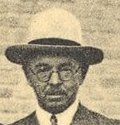Boris Uvarov facts for kids
Quick facts for kids
Boris Uvarov
|
|
|---|---|

B. P. Uvarov at the International Congress of Entomology in Madrid, 1935
|
|
| Born |
Boris Petrovitch Uvarov
3 November 1886 Ural'sk
|
| Died | 18 March 1970 (aged 83) London
|
| Alma mater | Saint Petersburg State University |
| Spouse(s) | Anna Fedorovna Fedorova (Prodaniuk) |
| Children | Evgenii (1910-1993) |
| Awards | Fellow of the Royal Society (1950) |
Sir Boris Petrovitch Uvarov (born November 3, 1886 – died March 18, 1970) was a famous Russian-British scientist who studied insects. He was especially known for his work on locusts, which are a type of large grasshopper. People even called him the "father of acridology," which is the study of locusts and grasshoppers.
Contents
About Boris Uvarov
Boris Petrovitch Uvarov was born in Ural'sk, a city in what was then the Russian Empire. Today, this city is called Oral, Kazakhstan. He was the youngest of three sons. His father worked at a bank.
Early Life and Education
Boris became interested in nature when he was young. His father gave him six books about animals, which helped spark his curiosity. He went to school in Uralsk from 1895 to 1902. There, one of his teachers, S. M. Zhuravlev, encouraged his interest in science.
After school, Boris briefly studied mining. But he soon realized his true passion was biology. In 1906, he switched to study biology at Saint Petersburg State University. He graduated in 1910.
Starting His Career
Boris's first job was studying insects at a cotton farm. In 1911, he moved to St. Petersburg. He then worked in Stavropol, focusing on the Migratory locust. He became the director of the entomology office at just 23 years old. He helped create scientific ways to control locust outbreaks.
In 1915, he moved to Tiflis, which is now Tbilisi, the capital of Georgia. After the Russian Revolution in 1917, times were tough. Boris even had to sell pies in the market to earn money!
Moving to London
A lucky meeting changed Boris's life. He met a British army scientist named P. A. Buxton in Georgia. Buxton then contacted another scientist, Guy Anstruther Knox Marshall, in London. In 1920, Boris was invited to join the Imperial Institute of Entomology in London.
He moved to London with his wife and son. He would not visit Russia again until 1968. In 1943, he became a British citizen.
Leading Locust Research
In 1945, Dr. Uvarov and his small team were officially named the Anti-Locust Research Centre in London. Over the next 14 years, this center became the world's top place for studying locusts. His team included sisters Zena and Nadia Waloff.
The center published many research papers. They also worked with scientists from all over the world. Boris Uvarov convinced the FAO to help coordinate research on locusts. This helped predict and control locust outbreaks globally. He wrote almost 430 papers himself. He made big contributions to understanding locust types, how their populations grow, and how to control them.
The Phase Theory
One of Boris Uvarov's most important ideas was the "phase theory" of locusts. He discovered that locusts can exist in two different forms:
- Solitary phase: When they live alone, like normal grasshoppers.
- Migratory phase: When they gather in huge swarms and migrate, causing great damage to crops.
He believed that changes in their environment could make them switch from the solitary to the migratory phase. He suggested that if we could control these environmental conditions, we might prevent locusts from forming destructive swarms. Throughout his career, he and his team studied what exactly caused this change. This included looking at their hormones, behavior, and genetics.
Awards and Recognition
Boris Uvarov received many important awards for his scientific work:
- Commander of the Order of St Michael and St George (1943)
- Knight Commander of the Most Distinguished Order of St Michael and St George (1961) for his work as Director of the Anti-Locust Research Centre. This meant he could be called "Sir."
- Fellow of the Royal Society (1950): This is a very high honor for scientists in the UK.
- Commander of the Royal Order of the Lion (Belgium, 1948)
- Honorary DSc (Doctor of Science) from the University of Madrid (1935)
- President of the Royal Entomological Society of London (1959–61)
When he was elected a Fellow of the Royal Society in 1950, his nomination said that his research on locusts helped create the "phase theory." This theory greatly influenced locust research worldwide. It also helped create international plans to prevent locust outbreaks. His studies in Africa helped connect weather conditions to locust migrations, which made it possible to predict where they would go. He also wrote many papers on other insects.
Family Life
Boris Uvarov's older brother, Nikolai, faced difficulties in Russia. Nikolai's daughter, Olga Uvarov, was brought from Russia to London in 1923. The International Red Cross helped her move.
Selected Works
- Uvarov, Boris-Petrovich. "A revision of the genus Locusta, L.(= Pachytylus, Fieb.), with a new theory as to the periodicity and migrations of locusts." Bulletin of entomological Research 12.2 (1921): 135-163.
- Uvarov, Boris Petrovich. "Locusts and Grasshoppers. A handbook for their study and control." Locusts and Grasshoppers. A Handbook for their Study and Control. (1928).
- Uvarov, Boris P., and Boris N. Zolotarevsky. "Phases of locusts and their interrelations." Bulletin of Entomological Research 20.3 (1929): 261-265.
- Uvarov, Boris Petrovitch. "Insects and climate." Transactions of the Royal Entomological Society of London 79.pt. 1 (1931).
- Uvarov, Boris. Grasshoppers and locusts. A handbook of general acridology Vol. 2. Behaviour, ecology, biogeography, population dynamics. Centre for Overseas Pest Research, 1977.
 | Audre Lorde |
 | John Berry Meachum |
 | Ferdinand Lee Barnett |

